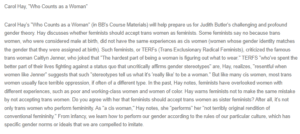Response – Carol Hay, ‘Who Counts as a Woman’
Carol Hay, in ‘Who Counts as a Woman,’ discusses a significant contemporary issue about feminists. Hay questions whether transwomen should be considered feminine. I believe that today, we live in a society that nurtures and accepts diversity and inclusivity. For years, transwomen faced oppression, rejection, and humiliation because society could not accept their sexuality. Similarly, women of all ages and races have faced difficulties that limit their essence in the community, at work, and even in marriages. It would be wrong to reject transwomen as feminists since it is by choice they are women. Besides, feminists fight for the freedom to choose, exist freely, and the right to equality. Why would they defy or deny these tenets when it comes to acknowledging transwomen? In my perspective, regardless of birth or by choice, femininity is about respecting all women and protecting their interests in the community. Additionally, Hay states that transgenders have spent most of their lives fighting against a status quo that seems to affirm gender stereotypes. Transwomen need the support of feminists, especially now that the global community is gradually evolving to accept diversity.
ORDER A PLAGIARISM-FREE PAPER HERE
We’ll write everything from scratch
Question

Carol Hay, ‘Who Counts as a Woman’
Carol Hay, “Who Counts as a Woman”
Carol Hay’s “Who Counts as a Woman” (in BB’s Course Materials) will help prepare us for Judith Butler’s challenging and profound gender theory. Hay discusses whether feminists should accept trans women as feminists. Some feminists say no because trans women, who were considered male at birth, did not have the same experiences as cis women (women whose gender identity matches the gender that they were assigned at birth). Such feminists, or TERFs (Trans Exclusionary Radical Feminists), criticized the famous trans woman Caitlyn Jenner, who joked that “The hardest part of being a woman is figuring out what to wear.” TERFS “who’ve spent the better part of their lives fighting against a status quo that uncritically affirms gender stereotypes” are, Hay, realizes, “resentful when women like Jenner” suggests that such “stereotypes tell us what it’s ‘really like’ to be a woman.” But like many cis women, most trans women usually face terrible oppression, if often of a different type. In the past, Hay notes, feminists have overlooked women with different experiences, such as poor and working-class women and women of color. Hay warns feminists not to make the same mistake by not accepting trans women. Do you agree with her that feminists should accept trans women as sister feminists? After all, it’s not only trans women who perform femininity. As “a cis woman,” Hay notes, she “performs” her “not terribly original rendition of conventional femininity.” From infancy, we learn how to perform our gender according to the rules of our particular culture, which has specific gender norms or ideals that we are compelled to imitate.

